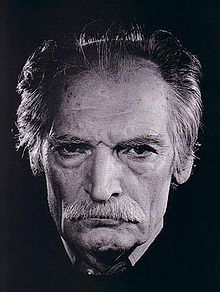Mahmoud Dowlatabadi
Mahmoud Dowlatabadi ( Persian محمود دولتآبادی; * August 1, 1940 in Dowlatabad Village, Razavi-Khorasan , Iran ) is an Iranian writer, actor and librarian. Mahmoud Dowlatabadi (also Doulatābādi) is considered one of the most important folk epics in Iran.
He finished elementary school in the village where he was born. In his youth he helped his father soles his canvas shoes. At the age of 13 he left his home village and lived in Eyvan-e key, east of Tehran . He worked as a shepherd, farm worker, bicycle mechanic and in a cotton factory. Later he went to Tehran and worked there in a printing company and as a hairdresser. In Mashhad he attended evening grammar school. He did not graduate from school but returned to Tehran, where he worked as a ticket inspector in a cinema, as a warehouse manager and as a theater prompter. At the age of twenty, he applied for the entrance examination to a drama school and was accepted regardless of the lack of a high school diploma. He then worked for 14 years in a theater company. In 1974 he was arrested by the Savak offstage at a Gorky performance that night and spent the next two years in prison.
He began writing and writing novels and plays in the 1960s. His novel Kelidar is one of the most important in Iranian culture. In addition to Arabic, his writings have also been translated into English, German, Swedish and Dutch.
Works in German translation
- The empty square of Ssolutsch (translation: Sigrid Lotfi), Unionsverlag, Zurich 1991, ISBN 978-3-293-20081-4 .
- Die Reise (translation by Bahman Nirumand ), Unionsverlag, Zurich 1992, ISBN 978-3-293-20139-2 .
- Kelidar (translation by Sigrid Lotfi), Unionsverlag, Zurich 1991, ISBN 978-3-293-20145-3 .
- The old earth (translation by Bahman Nirumand), Unionsverlag, Zurich 2000, ISBN 978-3-293-20318-1 .
- Der Colonel (translation by Bahman Nirumand), Unionsverlag, Zurich 2010, ISBN 978-3-293-20499-7 .
- Nilofar (translation by Bahman Nirumand), Unionsverlag, Zurich 2016, ISBN 978-3-293-20752-3 .
Web links
- Literature by and about Mahmoud Dowlatabadi in the catalog of the German National Library
Individual evidence
- ^ "Kindler's New Literature Lexicon", 1998, Vol. 21, p. 336
- ↑ Mahmud Doulatabadi. die horen 26 (1981), 2, p. 164
- ↑ Larry Rotherjuly: An Iranian Storyteller's Personal Revolution , published July 1, 2012 in the New York Times ; accessed on August 8, 2018
| personal data | |
|---|---|
| SURNAME | Dowlatabadi, Mahmoud |
| ALTERNATIVE NAMES | Doulatābādi, Mahmud |
| BRIEF DESCRIPTION | Iranian writer and actor |
| DATE OF BIRTH | August 1, 1940 |
| PLACE OF BIRTH | Dowlatabad , Khorasan, Iran |
